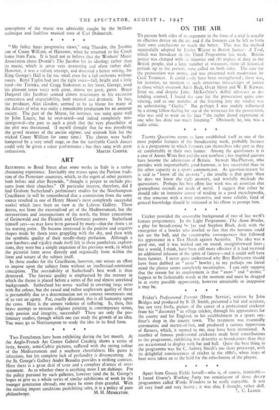ON THE AIR
To present both sides of an argument in the form of a trial is usually an effective device on the air, and if the listeners can be left to form their own conclusions so much the better. This was the method successfully adopted by Jenifer Wayne in British lusrice: A Trial, which was broadcast in the Third Programme last week. British justice was .charged with (a) injustice and (b) neglect of duty to the British people, and a large number of witnesses, from all historical periods up to the present, were called on both sides. The case fur the prosecution was strong, and was presented with moderation by Cecil Trouncer. It could easily have been strengthened ; there was, for instance, no mention of such notorious miscarriages of justice as those which overtook Adolf Beck, Oscar Slater and W. B. Kirwan. Even so, and despite James McKechnie's skilful advocacy as de- fending counsel, I found the case for the prosecution quite con- vincing, and as one member of the listening jury my verdict was an unhesitating " Guilty." But perhaps I was unduly influenced by a strong fellow-feeling for one of the witnesses for the prosecution, who was said to wear on his face " the rather dazed expression of one who has done too much listening." Obviously he, too, was a radio critic.
Twenty Questions seems to have established itself as one of the most popular features of the broadcasting week, probably because it is a programme in which listeners can themselves take part as they sit comfortably in their own homes. Among the questioners it is a case of Anona Winn first and the rest nowhere ; her inspired guesses have become the admiration of Britain. Stewart MacPherson, who presides with imperturbable good-humour, is less successful than in his other capacity as a sports commentator. As question-master he is said to " know all the answers " ; the trouble is that quite often he does not know the right answers, and woefully misleads the questioners. Perhaps his best effort last week was an assertion that gramophone records are made of metal. I suggest that either he should take an intensive course of reading in a good encyclopaedia, or that someone with a more extensive, and more reliable, fund of general knowledge should be stationed at his elbow to prompt him.
Cricket provided the seasonable background of two of last week's feature programmes. In the Light Programme, The Atom Bowler, a play for broadcasting by Jay and Stephen Black, dealt with the emergence of a bowler who bowled so fast that the batsmen could not see the ball, and the catastrophic consequences that followed his appearance in a Test Match against Australia. The idea was a good one, and it was worked out on sound, straightforward lines ; but it would, I think, have been still more effective if it had received an additional infusion of the spirit of fantasy—and it could well have been funnier. I never quite understood why Bert Barleycorn should have been dubbed an " atom " bowler ; to my perhaps too literal mind the phrase seems completely meaningless. I can only suppose that the reason for its employment is that " atom " and " atomic " happen to be fashionable words at the moment and must be dragged in at every possible opportunity, however unsuitable or inapposite it may be. * * * * Friday's Professional Portrait (Home Service), written by John Bridges and produced by R. D. Smith, presented a fair and accurate, but not very lively, picture of the career of a professional cricketer from his " discovery " in village cricket, through his appearances for the county and for England, to his establishment in a sports out- fitter's shop in the county town. The treatment was essentially unromantic and matter-of-fact, and produced a curious impression of flatness, which, it seemed to me, may have been intentional. A number of famous professional cricketers made brief contributions to the programme, exhibiting less dexterity as broadcasters than they are accustomed to display with bat and ball. Quite the-best thing in the programme was Sir C. Aubrey Smith's too short postscript, with its delightful reminiscences of cricket in the 188o's, when trays of beer were taken on to the field for the refreshment of the players.
* * * * Apart from Gracie Fields herself—who is, of course, inimitable— I found Gracie's Working Party too reminiscent of those dreary programmes called Works Wonders to be really enjoyable. It was all very loud and very hearty ; it was also, I thought, rather dulL
C. LLOYD.


































 Previous page
Previous page